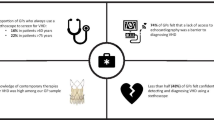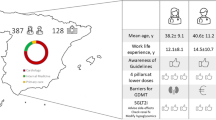Summary
A survey was conducted among 2,000 Germans at the mainline platforms of the two largest train stations in Berlin: Bahnhof Zoo and Ostbahnhof. These German citizens were surveyed concerning coronary risk factors, symptom complexes, angina pectoris, and acute myocardial infarction. An additional 400 Germans were questioned for gender-specific differences in cardiovascular disease. Our findings revealed a balanced relationship between male and female survey participants, and between the two German areas of origin (i. e., former West and East Germany). The share of those with college or university degrees was 37%, and 10% of the participants came from medical professions. Those surveyed indicated that 21% had, either themselves or among family members, directly experienced symptoms of angina pectoris or suffered myocardial infarction. The survey disclosed considerable deficiencies of information: only 2% of those surveyed were able to answer all questions posed correctly. There was no difference in this respect between the genders, or between Germans from former West and East Germany. Young Germans (<25) are significantly less well informed than are older (> 60).
The results of this survey are alarming. They clearly reveal that the great majority of the population is unable, in the event of cardiac emergency, to take advantage of the unique possibilities in Germany that are offered by its infrastructure of cardiac medical centers and its tightly meshed network of facilities for left-ventricular catheterization and cardiac surgery. This ignorance exists despite the fact that German taxpayers, with their billions of investments, have created some of the best facilities for such treatment in the world. Ongoing programs of public education are therefore urgently necessary to ensure satisfactory post-infarction utilization of already existing medical capacities. A total of 77% of those surveyed expressed the need and a desire for more information, and 70% placed the blame for these deficiencies on publichealth politicians and their lack of commitment.
Zusammenfassung
Es wurden 2 000 Bundesbürger auf den Fernbahngleisen der zwei größten Berliner Bahnhöfe (Bahnhof Zoo und Ostbahnhof) zu koronaren Risikofaktoren, Symptomatik und Angina pectoris des akuten Herzinfarktes sowie 400 Bundesbürger zusätzlich zu geschlechtsspezifischen Unterschieden bei kardiovaskulären Erkrankungen befragt. Es fand sich ein ausgeglichenes Verhältnis zwischen männlichen und weiblichen Befragten, ebenso zwischen ihrer Herkunft (alte vs. neue Bundesländer). Der Anteil an Akademikern betrug 37%, aus medizinischen Berufen kamen 10% der Teilnehmer. Von den Befragten hatten 21% entweder selbst oder bei einem Familienangehörigen bereits Symptome von Angina pectoris oder einem Herzinfarkt aus eigener Anschauung erlebt. Die Befragung erwies ein beträchtliches Aufklärungsdefizit, nur 2% der Befragten konnten sämtliche Fragen richtig beantworten. Dabei fand sich kein Unterschied zwischen Männern und Frauen, ebenso zwischen Bürgern aus den alten vs. neuen Bundesländern. Junge Bundesbürger (< 25 Jahre) sind signifikant schlechter informiert als ältere (> 60 Jahre).
Das Umfrageergebnis ist alarmierend und zeigt klar, dass die überwiegende Mehrzahl der Bevölkerung die einzigartigen Möglichkeiten in der BRD, was die Infrastruktur mit Herzzentren, deren flächendeckenden Linksherzkatheterplätzen und Herzchirurgien anbetrifft, im Ernstfall überhaupt nicht nutzen kann, obwohl der Steuerzahler mit milliardenschweren Investitionen die besten Voraussetzungen weltweit geschaffen hat. Eine kontinuierliche Aufklärungsaktion zur Nutzung der bereits vorhandenen Kapazitäten ist dringend erforderlich. Hier ist nach der Meinung von 77% der Befragten der Wunsch und das Bedürfnis nach mehr Aufklärung vorhanden, 70% werfen den Gesundheitspolitikern diesbezüglich fehlendes Engagement vor.
Similar content being viewed by others
Author information
Authors and Affiliations
Corresponding author
Rights and permissions
About this article
Cite this article
Baumann, G., Stangl, V., Grohmann, A. et al. Wie aufgeklärt ist der deutsche Bürger bezüglich kardiovaskulärer Notfälle?. Intensivmed 40, 590–598 (2003). https://doi.org/10.1007/s00390-003-0443-7
Received:
Accepted:
Issue Date:
DOI: https://doi.org/10.1007/s00390-003-0443-7




